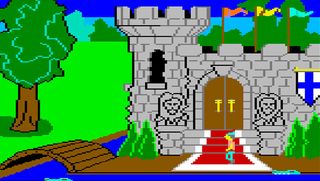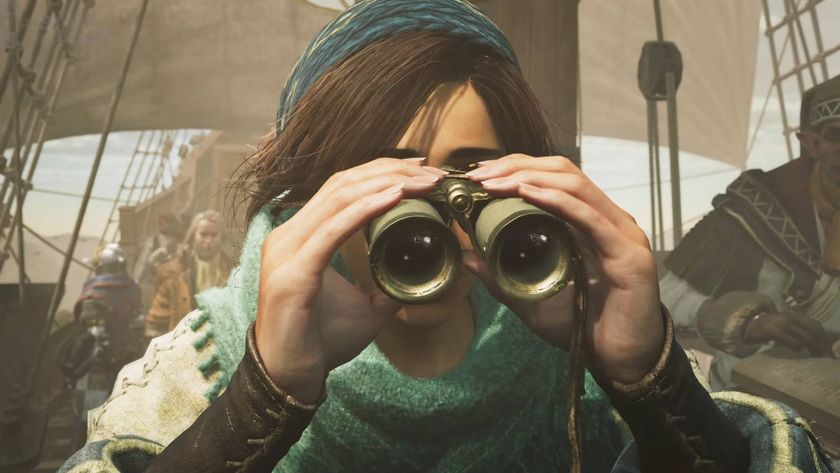The 50 most important games of all time
This is how the video game industry got to where it is today
The virtual foundation

Video games have come a long way since their inception. In the beginning, they often took the form of text-based adventures and ambiguous displays of pixels meant to represent characters or objects. Now? We've got visuals so stunningly realistic that it's sometimes hard to tell a virtual car from a real one, and bite-sized downloadables stylized as throwbacks to the old days. But we wouldn't be where we are today without the following 50 games - the most important ones of all time.
The word "important" can mean a lot of things, so let's clear this up right away. When we say these are the most important of all time, we aren't referencing how good they are; instead, these are the games that ultimately shaped the industry as it is today. The games that invented or popularized genres, or transformed video games from "kids' toys" into acceptable pastimes for people of all ages and walks of life. After countless debates over which of them belonged on our list and why, we're proud to present our 50 most important games of all time.
50. Zork (1980)

Zork wasnt the first purely text-based adventure game - that honor belongs to Colossal Cave Adventure. But it is the one that people remember most fondly, for the imaginative landscapes and creatures it evoked using nothing more than white words on a black background. Without any graphics to lean on, the player was forced to visualize their surroundings in the minds eye - and like any gripping novel, Zorks world felt that much more tangible with each nugget of info or surveying of the surroundings.
Sure, the game had its limitations; you could no doubt open mailbox or read letter, but there was no way the game could understand your input of urinate pants while cowering in fear of being eaten by a grue. Regardless, Zork sparked the imaginations of all who played it, paving the way for entire generations of adventure games that would follow.
49. Gran Turismo (1997)

Gran Turismos importance is very simple to explain. Before it, racing games were almost exclusively arcadey racers that only tried to be as fun as possible. Gran Turismo instead simulated the level of grip your vehicles tires have with the road, and dressed it up with the most realistic graphics a 32-bit console could ever muster. Amazingly, the outcome of all this realism was still fun.
Chucking cars into corners, drifting through curves, and feeling the rumble through the new DualShock controller felt super-deluxe, and was reason enough to own a PlayStation. The series has undoubtedly lost its clout since GT3, but this game is still the single reason why arcade racers are so infrequent these days.
48. E.T. the Extra-Terrestrial (1982)

In 1982, Steven Spielberg created a magical Jesus-alien who descended upon American suburbia to bring light, hope, and life to all who made contact with him. Later that year, the same alien returned--only this time, he brought devastation.
Sign up to the 12DOVE Newsletter
Weekly digests, tales from the communities you love, and more
E.T. certainly wasnt the only game that contributed to the gaming market crash of 1983. The glut of consoles choking the marketplace with their raft of rushed-out, piss-poor games had been weakening things for years. But E.T. was the high-profile, Christmas-released straw that shattered the camel's calcium-deficient spine. It crippled Atari with massive losses and set the whole house of cards crumbling. Which left the stage wide open for a company called Nintendo to enter and reboot things a couple of years later.
47. FarmVille (2009)

Even if youve never played FarmVille, chances are you've seen your Facebook feed inundated with requests to help your buddy find five pigs or save up enough gold for a new barn. And that's where its influence is abundantly obvious. In a new market where social gaming was suddenly a thing, Farmville succeeded in hooking in casual gamers who might otherwise have never touched a video game, taking over their lives and their social networks.
It may not have lasted forever, but it showed everyone how microtransactions in a free-to-play game could make billions of dollars, and is arguably the reason why the free-to-play model is so widespread today. For better or worse, you cant deny that FarmVille massaged its market brilliantly.
46. Resident Evil (1996)

Resident Evil didn't invent survival horror--that distinction falls to earlier games like Sweet Home (on which Resi is based) and Alone In The Dark--but it was certainly the game that popularized the genre when it appeared on the PlayStation back in 1996. Since then, Resident Evil has become a pop culture phenomenon, spawning games, films, comics and novels. And despite the questionable quality of recent entries, it remains one of the most important gaming brands.
Resident Evil 4 may be the series pinnacle, and Silent Hill 2 the height of the survival horror genre, but neither would have achieved so much--or even existed--without this original Raccoon City scare-fest.
45. RuneScape (2001)

Nobody threw around terms like browser-based game and free-to-play before Runescape. By todays standards, the classic, pre-overhaul world looks like it was comprised using MS Paint scrawlings. But in 2001, seeing a three-dimensional fantasy world functioning inside your Internet Explorer window was utterly stunning. And the fact that anyone could enter this medieval realm, at any time, meant that there was always something to do and someone to talk to.
Runescape offered all the questing, item drops, trading, and general socializing that one finds in an MMO, without asking anything of the player besides their time. Eventually, the option to subscribe was implemented--but Runescape never abandoned its non-paying players, and you can, to this day, venture into its densely populated world without spending a dime. It was the dawn of the F2P model of gaming thats slowly but surely becoming the MMO--if not the entire industry--standard.
44. King's Quest (1984)

Before 1983, graphics and adventure games werent exactly getting along. Sure, games like Mystery House gave you a visual depiction of where you were--but these scenes were little more than still images, and fairly simplistic ones at that. But Kings Quest said to hell with that, dropping players into the brown boots of Graham (Grahame, to you old folks), a controllable character that could actually move throughout the scenic backdrops. This kind of interactivity in a command-based adventure game was mind-blowing.
Beside the fact that your keyboard inputs could cause on-screen elements to react, Kings Quest also upheld the proud text-based tradition of brain-tickling puzzles. This time around, though, youd actually see Graham reach down to pick up an item, instead of having such a mundane action described to you. Without Kings Quests pioneering, point-and-click adventure games would be little more than digital picture books.
43. Dance Dance Revolution (1998)

Ladies and gentlemen, you owe a big debt to Dance Dance Revolution. Remember that time you managed to finally get close to that girl you really liked by doing a duet with her on "The Final Countdown" in Singstar? How about the time you finally got to hammer out "Free Bird" in Guitar Hero, despite your crippling inability to play a real guitar? Well, Dance Dance Revolution put rhythm action games on the map--and without DDR, none of these musical moments would've existed.
OK, so were simplifying it a little. By transforming simple rhythm-action games into social events at arcades, DDR paved the way for all party games,' and its fundamental message that games are more fun when played with friends is the same ethos behind Nintendos gender-and-age-spanning Wii consoles. On the flip-side, though, its also partly responsible for filling your living room with dust-gathering plastic instruments.
42. Sid Meier's Civilization (1991)

Though the term "4X" (explore, expand, exploit, exterminate) in relation to strategy games wasn't coined until 1993, Sid Meier's Civilization was the game that established the genre's core concepts. 4X strategy games typically involve building an empire and expanding it through military conquests, peaceful diplomacy, or a mixture of the two.
All the way back in 1991, Civ contained an impressive level of detail and became the standard by which future 4X games were judged. Many 4X concepts were borrowed from board games, such as Risk--and though there are many franchises structured around building and maintaining an empire, Civilization strikes an astounding balance between complexity and accessibility.

Sam Loveridge is the Brand Director and former Global Editor-in-Chief of GamesRadar. She joined the team in August 2017. Sam came to GamesRadar after working at TrustedReviews, Digital Spy, and Fandom, following the completion of an MA in Journalism. In her time, she's also had appearances on The Guardian, BBC, and more. Her experience has seen her cover console and PC games, along with gaming hardware, for a decade, and for GamesRadar, she's in charge of the site's overall direction, managing the team, and making sure it's the best it can be. Her gaming passions lie with weird simulation games, big open-world RPGs, and beautifully crafted indies. She plays across all platforms, and specializes in titles like Pokemon, Assassin's Creed, The Sims, and more. Basically, she loves all games that aren't sports or fighting titles! In her spare time, Sam likes to live like Stardew Valley by cooking and baking, growing vegetables, and enjoying life in the countryside.















